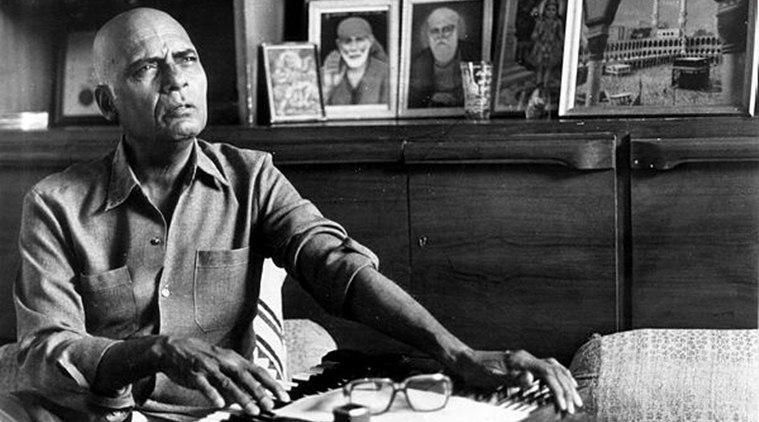Khayyam – ‘A Storehouse of Feelings, Emotions and Music’

Image Courtesy: Indian Express
Mumbai: Longing is how one would describe Khayyam's music and the admirers of the veteran music composer, who breathed his last on Monday, will keep revisiting his melodies like patrons returned to listen to Umrao Jaan's songs in the eponymous film.
It was a different time and Khayyam, who passed away after a prolonged illness at the age of 92, created evocative, soul-stirring music reminiscent of the era gone-by in classics such as Umrao Jaan and Kabhi Kabhie.
Songs such as 'Dil cheez kya hai aap meri jaan lijiye', 'In aankhon ki masti ke', 'Ye kya jagah hai doston' or 'Zindagi jab bhi teri bazm mein lati hai hume' from the Rekha-starrer Umrao Jaan and 'Kabhi kabhie mere dil mein' from Kabhi Kabhie will keep Khayyam's memory alive for generations to come.
Mohammed Zahur Hashmi, popularly known as Khayyam, was born in 1927 in Rahon in the undivided Punjab state.
It is said that when he was a child, he ran away to his uncle's house in Delhi to learn music. Though his uncle admitted him to a school, he was impressed by Khayyam's passion for music and helped him nurture it.
At the age of 17, Khayyam started his musical journey in Lahore, assisting noted Pakistani music composer Baba Chisti. He worked with Chisti for six months but left it to serve the British Army during the World War II.
On his return, he moved to Mumbai to further pursue his dreams of being a music director. In Mumbai, Khayyam made his debut as 'Sharmaji' of the music composer duo -- Sharmaji-Varmaji with Rahman Varma.
They scored their first composing gig for 1948 film Heer Ranjha.
The partnership broke up after Varma decided to move to the newly-created Pakistan after the Partition.
Khayyam then decided to work as a solo artiste and gave music for films such as Biwi (1950), Footpath (1953) and Phir Subah Hogi (1958).
The track “Akele mein wo ghabrate to honge”, sung by Mohammad Rafi, brought the composer to people's notice.
It was, however, the Raj Kapoor and Mala Sinha-starrer “Phir Subah Hogi” that brought Khayyam widespread acclaim.
For the music album, he worked with noted poet Sahir Ludhianvi and singers Mukesh and Asha Bhosle.
"Woh subah, kabhi to aayegi" is one of the most memorable songs from the film. The ace composer found further acclaim with 1961 blockbuster Shola Aur Shabnam which established Khayyam as a force to reckon with in the music industry.
The album contained songs by top singers like Rafi, Lata Mangeshkar and his wife Jagjit Kaur. Noted poet-lyricist Kaifi Azmi had penned the tracks.
Khayyam followed it up with musical superhits -- Mohabbat Isko Kehte Hain (1965) and Aakhri Khat (1966), which marked the debut of Rajesh Khanna.
Then came Yash Chopra's Kabhi Kabhie (1976), featuring a star-studded cast of Amitabh Bachchan, Raakhee, Shashi Kapoor, Waheeda Rehman, Rishi Kapoor, Neetu Singh and Simi Garewal.
Khayyam's soundtrack for the film was widely praised by both the masses and critics for its soulful and mesmerising music. The title track by Mukesh with lyrics from Ludhianvi is still etched in public memory as one of the best romantic songs of all time.
In the year 1981, Khayyam reached the pinnacle of his career with his multiple award-winning music for Muzaffar Ali's Umrao Jaan. It is said that Khayyam was not the director's first preference for the film but he eventually came on board after Jaidev left the project following a tiff with Ali.
Ali remembered Khayyam as a "storehouse of feelings, emotions and music".
“I couldn't imagine music without him. It took almost two years for us to make music for Umrao Jaan. Day in, day out, I used to go to him. He used to stay at my house. It was an evolution of music,” Ali told PTI.
He is still remembered for the tenderness he gave to the songs like “Dil cheez kya hai” and “In aankhon ki masti ke” as well as making a star out of Asha Bhonsle, who voiced all the three tracks.
Awards, glory came his way once again with the film as Khayyam bagged his second Filmfare trophy for the Best Music Director. He also won the National Award for Best Music Direction for Umrao Jaan.
Get the latest reports & analysis with people's perspective on Protests, movements & deep analytical videos, discussions of the current affairs in your Telegram app. Subscribe to NewsClick's Telegram channel & get Real-Time updates on stories, as they get published on our website.














